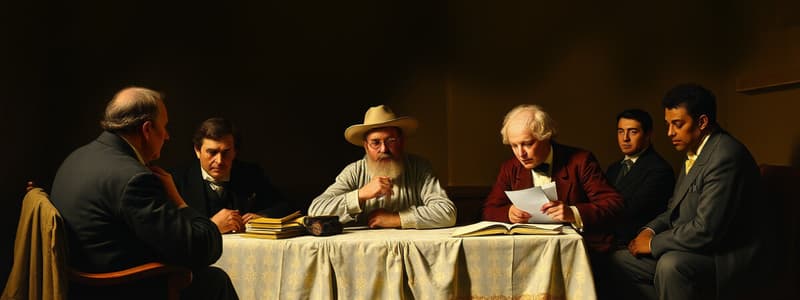Podcast
Questions and Answers
What name was given to African Americans who migrated to Kansas during the Exoduster Movement?
What name was given to African Americans who migrated to Kansas during the Exoduster Movement?
- Freedmen
- Radical Republicans
- Exodusters (correct)
- Reconstructionists
What was the Freedman's Bureau established for?
What was the Freedman's Bureau established for?
To aid freedmen in the South during the Reconstruction era.
Who was the 17th President of the United States?
Who was the 17th President of the United States?
Andrew Johnson
What did Lincoln's '10 Percent' Plan propose?
What did Lincoln's '10 Percent' Plan propose?
The Wade-Davis Bill was enacted during the Reconstruction period.
The Wade-Davis Bill was enacted during the Reconstruction period.
Which of the following best describes the Radical Republicans?
Which of the following best describes the Radical Republicans?
What were Black Codes?
What were Black Codes?
Flashcards are hidden until you start studying
Study Notes
Exodusters
- A term for African Americans migrating from the Mississippi River states to Kansas in the late 19th century, known as the Exoduster Movement or Exodus of 1879.
- Marked the first significant migration of blacks post-Civil War.
- Supported by figures like Benjamin Singleton and Henry Adams.
- Approximately 40,000 Exodusters settled in Kansas, Oklahoma, and Colorado.
Freedman's Bureau
- Officially the Bureau of Refugees, Freedmen, and Abandoned Lands, established in 1865.
- Aimed to assist freed slaves in the South during the Reconstruction era.
- Worked to transform society in the former Confederacy.
Andrew Johnson
- 17th President of the United States (1865-1869), assumed office after Lincoln's assassination.
- A Democrat favoring quick restoration of seceded states to the Union.
- His lenient approach disregarded protections for former slaves, leading to conflict with Congress.
- First American president impeached; acquitted in Senate by a single vote.
Lincoln's "10 Percent" Plan
- Proposed during the Civil War for the reintegration of Southern states, introduced in December 1863.
- Required 10% of voters from the 1860 count in a state to take an oath of allegiance for re-admittance.
- Allowed voters to elect delegates for new state constitutions and governments.
- Excluded high-ranking Confederate officials from full pardons, while protecting southern private property.
Congress' Wade-Davis Bill
- Proposed in 1864 by Radical Republicans Benjamin Wade and Henry Winter Davis for reconstructing the South.
- Required a majority in each Southern state to take an Ironclad oath affirming non-support for the Confederacy.
- Passed both Congressional houses but was pocket vetoed by Lincoln, failing to become law.
- Sparked outrage among Radical Republicans due to Lincoln's leniency with the Ten Percent Plan.
"Radical" Republicans
- A faction of the Republican Party active from around 1854 until the end of Reconstruction in 1877.
- Opposed moderation in Reconstruction and demanded strict measures against ex-Confederates.
- Advocated for civil rights and voting rights for freedmen, reflecting their anti-slavery stance.
Black Codes
- Laws enacted by Southern states in 1865 and 1866 following the Civil War.
- Aimed to restrict African Americans' freedoms and ensure their labor in low-wage or debt bondage situations.
- Part of a broader effort by Southern whites to undermine the freedom of emancipated African Americans.
Studying That Suits You
Use AI to generate personalized quizzes and flashcards to suit your learning preferences.
